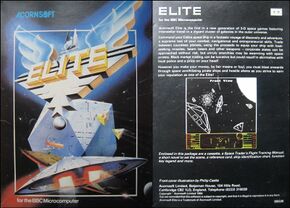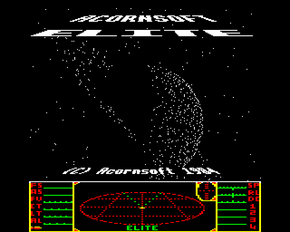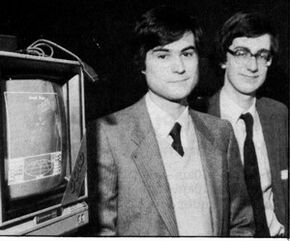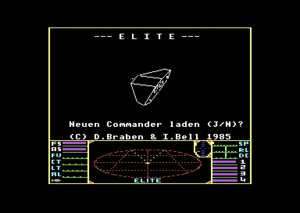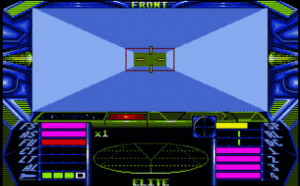Classic Elite
| Elite | |
|---|---|
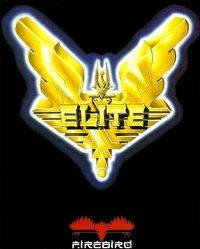
| |
| Developer | Ian Bell David Braben |
| Publisher | Acornsoft Firebird Torus Microprose Telecomsoft Hybrid |
| Latest version | Elite Elite Plus ArcElite |
| Release date(s) | 1984 |
| Platform(s) | BBC Micro Acorn Electron Commodore 64 Sinclair ZX Spectrum Amstrad CPC Apple ][ IBM PC Atari ST Amiga MSX Tatung Einstein NES Acorn Archimedes |
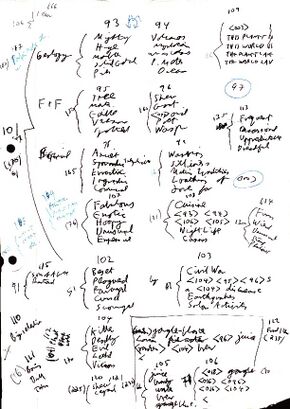
See Where do these crazy names come from?
Elite is a seminal space trading computer game, originally published by Acornsoft in 1984 for the BBC Micro and Acorn Electron computers and subsequently ported to many others. The game's title derives from one of the player's goals to raise their combat rating from Harmless, through Mostly Harmless, Poor, Average, Above Average, Competent, Dangerous, Deadly, before reaching the exalted heights of Elite.
Contents
Contents
The BBC version of the game originally came on cassette in a box - on the top left there is a photograph of the front and back. The box contained:
- the cassette with the game on it.
- instructions on loading the game.
- a strip of card to place above the red function keys on the BBC Micro explaining their role in game (Launch/Buy Cargo/Equip Ship/Long range chart etc).
- a wall chart for identifying ships.
- 'The Space Traders Flight Training Manual.
- a copy of The Dark Wheel novella.
- a postcard for posting back to Acornsoft when one reached Elite status, so that they could send one a special badge!
- The Elite Player's Guide was authored by Bell and Braben but did not make it into the box.
The player initially controls "Commander Jameson" and starts at the Lave orbital space station with 100 credits and a lightly armed Cobra Mark III. Most of the ships that the player encounters are named after snakes or other reptiles. Credits can be accumulated through piracy, trade, military missions, bounty hunting and asteroid mining. This money allows the player to upgrade the ship with improved weapons, a larger cargo hold, an automated docking system, an extra energy bank and more.
The later non-BBC ports of the game variously added new ships, more colour, replaced The Dark Wheel with Imprint, etc.
Comment
| I think a lot of it is due to the imagination factor...
Years ago (in the early 90s) the topic of Elite came up at a party. We'd been talking about computer games and etc, and a few people had played Elite. But some of the things they remembered were odd, in that I'm fairly sure they didn't actually exist in any form of Elite. They'd all played it before, but I was making my first runs at that time. I'm not one of the people who played Elite when it first came out, I couldn't afford a computer then. I was playing the DOS version on a Radio Shack computer that was not quite as good as a 286. LOL Anyway, one of them talked about how he'd often been boarded by "the vipers" and inspected for contraband. Some others agreed it sucked when that happened. One recalled, in some detail, a mission where he was carrying some special sort of missile and it malfunctioned while onboard his ship and had to be defused, which involved figuring out some sort of numeric code. Another recalled having gotten her engines and shields upgraded as a result of an encounter with friendly aliens. Alien ships flying in large geometric formations before they'd break to attack. An alien homeworld or secret base. Having a wingman/partner that flew along and occasionally advised. Emergency missions running a special load of vaccine to worlds having plagues. Struggling to avoid falling into a black hole. Intercepting messages that had to be decoded in some way. Seeing the wreckage of your own ship if you restarted and then later found exactly the same spot where you'd been shot down. At the time, I wasn't far into the game, so all this sounded plausible enough. I just nodded and figured it was out there somewhere and I'd find it eventually. One thing they agreed on was that Elite was the greatest spacegame of all time, far better than others I'd played at that time, like Starflight or Wing Commander. Oh, the graphics and etc were "old school", but there was agreement that it was by far the best game. While there might have been some alcohol-inspired exaggeration in some cases, I don't think they were trying to intentionally BS me so much as that they actually *did* remember the game that way. In some cases, I think it likely they mis-remembered features of other games as being somewhere in Elite. In other cases, I think that the universe and adventures that they imagined, the "game in the head", superseded reality and they recalled the game as being much more than it actually was. That's one of the qualities of a legend though, isn't it? When a thing is remembered as perhaps greater and more wonderful than it actually was. Not many other games result in as many "tall tales" as Elite. One thing they agreed on, though, was that it wasn't like most other games. You could just get in your ship and go.. and keep going. There was nothing you *had* to do or accomplish, and you could just go forever, bumming along through space and seeing what wonders you could find. Kind of a "Holy Grail" of games, the game that never had to end. So I'm pretty sure they actually played it and weren't just BS-ing. For all the odd things that aren't in the game that some of them were sure they remembered, not a one of them ever claimed to see a "game over" other than in the personal sense of "press space". |
| (Ganelon 2011) |
The authors
For the time (1983) it was relatively unusual to have more than one author for a game, but David Braben and Ian Bell realized they were working on similar projects and collaborated whilst undergraduates at the University of Cambridge to produce Elite.
There are two excellent stories of the original elite: the first concerns how the enterprising duo were able to cram the game into 32k of memory. The second concerns their difficulties in finding a publisher for it.
See how David Braben and Ian Bell created Elite, by watching the documentary Brits Who Made The Modern World.
Different Versions
As the years went on and computers became more sophisticated, the various versions of Classic Elite ported to each became more sophisticated, including new ships, missions, equipment, twiddles, etc. Some of these were published by Firebird. The most renowned was that for the Archimedes computer. But see Category:Classic Elites (different versions) for more details.
The various missions were included in the Oolite Vanilla game, the extra ships can be found in a number of oxp's. See Category:Classic ships and its links.
Firebird
Bell & Braben also signed another contract with Firebird (part of British Telecom, until bought out by Microprose in 1989) for porting to other computer systems (IBM, Apple, Commodore, Amstrad etc.). Firebird developed the famous ads seen above.
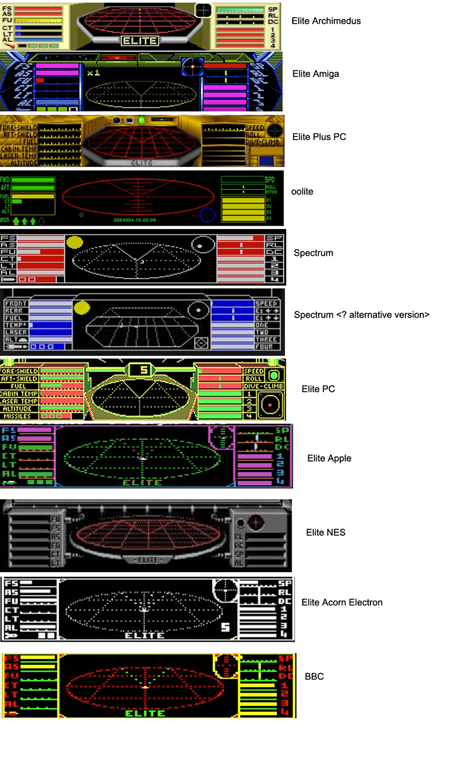
See also
- Elite Tactics
- Classic Elite ships
- Classic Elite ships firepower
- Classic Elite ships wireframe
- Classic Elite sounds
- Classic Elite entity states
- Classic Elite planet descriptions
- a 'historically preserved document' rescued from a Google cache that contains a lot of information on various classic forms of Elite.
- Forgotten versions of elite (2009) - see especially the descriptions of Novosibirsk Elite!
- Varieties of Classic Elite with notes on them
- What was the first version of Elite you ever played? (2007) - includes poll
- Legends of Elite
- Lore - debates over what the original Elite really was (was the novel really compatible with the game?).
- Vanilla game - the original Strict Game choice in the earlier versions of Oolite was an Elite emulator (no new equipment, etc).
- Elite stories
- Comparing Oolite gameplay with classic versions - summary (2006) - note this is for old Oolite.
External links
- Why does Elite still matter? (2012)
- Best sources on Elite game design (2016).
- Influence of Traveller RPG on Elite (2007).
- DOS Days (Old PC Computing Resource) - data on the hardware in those days
Elite sites
Most of the various Elite sites have foundered over the decades. These still worked in Dec 2020:
- Ian Bell's very own website with Maths for programmers, Elite game code (in C), Elite Manual, The Dark Wheel & UV body art!
- BBCElite.com has more stuff for programmers
- Acorn Arcade with hints, pictures, fiction & resources...
- FrontierAstro - also good for Frontier (courtesy of Commander Steve). Still updated in 2025.
- Mufossa's Elite Site - also good for Frontier. With fiction
- The original game code
- The Holy Scripture of Elite And lo, it came to pass that the words of Braben didst fall upon the ears of the Quakerites, who were smote with the joy and happiness of knowing the Elite, their heathen beliefs broken asunder beneath the clouds of Achenar...
- Elite Universe Editor by Mark Moxon (2020-22)
- Elite F7 screens A humorous and randomly-generated tourist brochure for the galaxy, based on the computer game Elite by Lucian Wischik (1990s?)
- Commander Mic has some goodies, including a downloadable add-on for planetary exploration ("Elite Plus")
History of Elite sites
- The Platform and the Player: exploring the (hi)stories of Elite An academic stab at a history of the development of Elite by Dr Alison Gazzard of UCL
- The History of Elite: Space, the Endless Frontier Article by Matt Barton & Bill Loguidice (Design)
- Part of the book by Thomas Spufford who did the TV show on the making of Elite
- New Film on History of Elite by Kim Justice (2019).
- 40th Anniversary retrospective (The Register.com, 2024)
Dramatic Side of Elite
- Elite - the musical from Ian Bell's website.
Sartorial Side of Elite
- Elite t-shirt put up by Winston in 2006.
Oolite
- Lore Collection (Classic Elite) adds the relevant oxz's from the Expansions Manager to help transform Oolite into a lore-laden Elite (but see the wiki page for details of unincluded oxp's)
